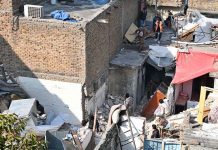Staff Report
ISLAMABAD: Nutrition integration has become a critical challenge that must be responded through the right policies and actions at every level including in social protection and early education. A holistic approach would be a key to respond to this need to ensure a healthy population. The experts from academia, civil society, and private sector, shared this viewpoint with the participants at the webinar ‘Nutrition integration for social protection and early education,’ organized by the Sustainable Development Policy Institute (SDPI) here Thursday.
Head of department public health, Dr Shahzad Ali Khan, termed malnutrition as a huge problem in the country and said that Pakistan has placed in stunting growth index on 2nd number after Afghanistan which is a quite unfortunate fact. He added further that the worst in all indicators of stunting, wasting, underweight and exclusive breastfeeding. He added further that minimum acceptable diet, meal, and minimum diet diversity in Pakistan is poor in both terms of quality and quantity and hence, it must be improved.
Department of Early Childhood Education, Allama Iqbal Open University (AIOU), informed the participants that the ECE worked closely with Pre-schooling in earlier years as it is an important positive element that will make it easier to develop problem solving skills. Senior Research Fellow, SDPI, Dr Shafqat Munir, was of view that to create resilience in people both financially and infrastructure outlook is important to manage social-economic issues. He added further that social integration protection can be achieved by creating equal opportunities and equity space in risk and crisis management. Focal Person for Nutrition, Ehsaas and Poverty Alleviation & Social Safety Division, Dr Rozina Khalid, enlightened the participants that EHSAS Program has been addressed Nashunuma Programme with human capital development to materialize the pillars of malnutrition and stunting.
While highlighting different aspects of the initiative, she said that three years pilot interventions are included in the plan with the help of shared work done by Provincial health, WHO and Agha Khan with steering committee already upscale the better services.
Aliya Habib,Focal Person Nutrition International, emphasized that highlighting other indicators beyond just the malnutrition are important at policy level and work for their implementation. She added further that the collective integrated policy document needed by both health and education sector.
Head of Gates Foundation family planning and advocacy, Dr Yasmeen Qazi, on the occasion highlighted that birth Spacing, and mother child health is important subject in terms of nutrition which cannot be separated from women cause. The trend that males do not accept contraceptive further adds to this problem, she said and added further that pre-marriage counselling for young adolescent girl and information about life cycle approach is also needed, she said.




